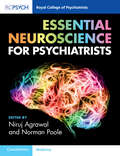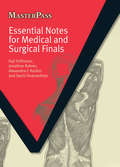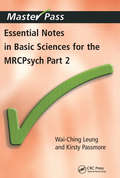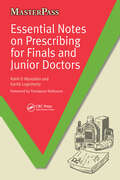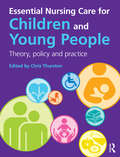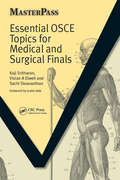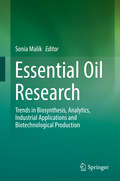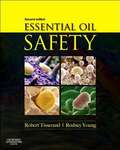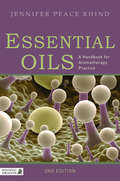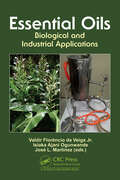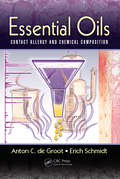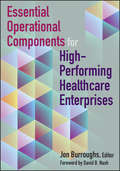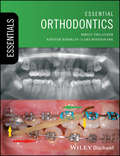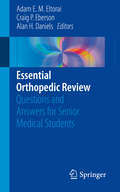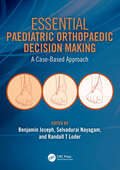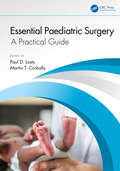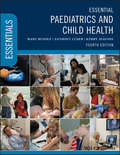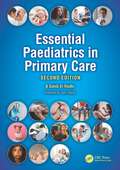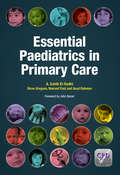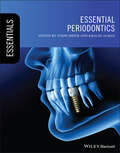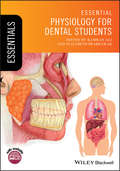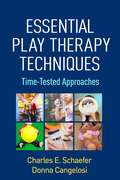- Table View
- List View
Essential Neuroscience for Psychiatrists
by Niruj Agrawal Norman A. PooleNeuroscience is increasingly understood to ground the practice of psychiatry, but clinicians can be overwhelmed by the competing facts and unfamiliar approaches utilised. This book provides key, up-to-date findings in neuroscience, and their relevance to clinical psychiatry in an approachable format. Clinical experts summarise the most important findings in diverse fields of neuroscience and explain their relevance for clinical practice. Topics include neuroanatomy, neurophysiology, neuropharmacology, and neurophilosophy, imparting essential knowledge for the MRCPsych syllabus and exams, as well as conveying important recent developments. Each chapter is designed to aid comprehension and learning with suggested readings, equipping the reader with the knowledge and skills to understand, assess, and treat those with mental health problems in the 21st Century. Expertly covering essential neuroscience topics with a clear emphasis on clinical relevance, this book is ideal for clinicians in psychiatry, psychology, and allied fields such as mental health nurses.
Essential Notes for Medical and Surgical Finals
by Kaji Sritharan Jonathan Rohrer Alan Rankin Sachi SivananthanCovering both medicine and surgery, this book is the essential revision companion for all medical students and a valuable source of knowledge for junior doctors at all stages of their training. It is useful both in the early preparatory phase of revision as well as for last minute cramming, and for use on the wards. This book divides the medical and surgical curricula into over twenty key sections and concisely covers the relevant information for each, including definitions, aetiology, key clinical features, investigations, and management. Examinations for undergraduate medical students and at postgraduate level can take a number of forms, including multiple choice and extended matching questions, single best answers, short notes, vivas and OSCEs. The book provides the necessary information to tackle all these exam formats successfully, as well as to manage each topic competently should it arise in clinical practice. Compact and user-friendly, this book is the ideal revision tool.
Essential Notes in Basic Sciences for the MRCPsych: Pt. 2 (MasterPass)
by Wai-Ching Leung Kirsty Passmore* Fast access to useful facts for GPs and health planners. * Vital data on the NHS and GP workload condensed into a readable format. * Detailed information drawn from many varied sources. * Concise and easy to read. * Especially useful for GP registrars and candidates preparing for the MRCGP. * Doctors nurses pharmacists and healthcare professionals can digest the data without creating unnecessary dyspepsia or reflux!
Essential Notes on Prescribing for Finals and Junior Doctors (MasterPass)
by Rahil D MandaliaThis book provides the senior medical student and the foundation doctor with the knowledge and confidence to prescribe safely and appropriately, together with practical examples of prescribing in common conditions. It addresses the transition between learning medicine and practising it.
Essential Nursing Care for Children and Young People: Theory, Policy and Practice
by Chris ThurstonEssential Nursing Care for Children and Young People is the definitive guide for all nursing and healthcare students and professionals caring for children and young people. Designed to meet the 2010 NMC competency standards for pre-registration nurses, the textbook supports you through the process of caring for children and young people with varied needs and conditions across all healthcare settings. A practical, patient-centred approach is taken throughout, with the 'voices' of children, their families and their carers used to tie theoretical knowledge to the real experience of providing care. The inclusion of the latest research and health and social care policies ensures that you are fully in line with the latest clinical practice, whilst the book's activities and exercises allow you to regularly check your understanding and develop confidence during your journey from student to nursing professional. Main features: Course-Focused Approach - pedagogy and content designed specifically for all three years of the child nursing degree programme. Contemporary Content - research note features and policy integrated throughout to give you instant access to the latest evidence-based practice. Illustrated Throughout - this highly accessible text regularly uses pictures and diagrams to highlight key issues. Voices - include authentic experiences of children, young people, parents, carers and professionals to help develop a patient-focused attitude to care. Pertinent A&P - includes coverage of all relevant anatomy and physiology for child and young person nursing courses. Practice Guidelines - provide practical guidance on everyday procedures for your quick reference. Activities and Answers - allow you to check your knowledge and build confidence. Specialist Authors - each chapter is written by leading experts in each area. Essential Nursing Care for Children and Young People is the ideal main textbook for all undergraduate child and young person nursing students, as well as professionals wanting to ensure they are using the latest practice. This text is also relevant to any student or professional involved in the health and social care of children and young adults.
Essential OSCE Topics for Medical and Surgical Finals (MasterPass)
by Kaji Sritharan Vivian Elwell Guy MolyneuxObjective Structured Clinical Examinations (OSCEs) are commonly encountered at all levels of medical school including the final MBBS examination. OSCEs also play an important role at postgraduate level and are used to assess competency in the Foundation Years.
Essential Oil Research: Trends in Biosynthesis, Analytics, Industrial Applications and Biotechnological Production
by Sonia MalikThis book highlights the advances in essential oil research, from the plant physiology perspective to large-scale production, including bioanalytical methods and industrial applications. The book is divided into 4 sections. The first one is focused on essential oil composition and why plants produce these compounds that have been used by humans since ancient times. Part 2 presents an update on the use of essential oils in various areas, including food and pharma industries as well as agriculture. In part 3 readers will find new trends in bioanalytical methods. Lastly, part 4 presents a number of approaches to increase essential oil production, such as in vitro and hairy root culture, metabolic engineering and biotechnology. Altogether, this volume offers a comprehensive look at what researchers have been doing over the last years to better understand these compounds and how to explore them for the benefit of the society.
Essential Oil Safety: A Guide For Health Care Professionals (Second Edition)
by Robert Tisserand Tony Balacs Rodney YoungThe second edition of this book is virtually a new book. It is the only comprehensive text on the safety of essential oils, the first review of essential oil/drug interactions, and it provides detailed essential oil constituent data not found in any other text. Much of the existing text has been re-written, and 80% of the text is completely new. There are 400 comprehensive essential oil profiles and almost 4000 references. There are new chapters on the respiratory system, the cardiovascular system, the urinary system, the digestive system and the nervous system. For each essential oil there is a full breakdown of constituents, and a clear categorization of hazards and risks, with recommended maximum doses and concentrations. There are also 206 Constituent Profiles. There is considerable discussion of carcinogens, the human relevance of some of the animal data, the validity of treating an essential oil as if it was a single chemical, and the arbitrary nature of uncertainty factors. There is a critique of current regulations. The only comprehensive text on the safety of essential oils The first review of essential oil/drug interactions Detailed essential oil constituent data not found in any other text Essential oil safety guidelines 400 essential oil profiles Five new chapters 305 new essential oil profiles, including Cedarwood, Clary sage, Lavender, Rose, Sandalwood, Tea tree 79 new constituent profiles Five new chapters: the respiratory system, the cardiovascular system, the urinary system, the digestive system, the nervous system. Significantly expanded text
Essential Oils: A Handbook for Aromatherapy Practice Second Edition
by Jennifer Peace RhindRevised and significantly expanded, the new edition of this handbook provides full information on the use of essential oils in the field of contemporary aromatherapy, based on the research evidence behind their therapeutic applications. The author provides the historical and cultural context for our understanding of aromatherapy, with an overview of its relationships with Greek, Chinese and Ayurvedic medicine. She gives a detailed account of how essential oils are created, how and where aromatherapy is used, the underlying pharmacology, and the current research. The characteristics of over 100 essential oils, absolutes and resinoids are provided in detail, including botanical and chemical information, usage and combinations. This will be an indispensable text for all students and practitioners of aromatherapy and related disciplines, as well as anyone interested in the use of essential oils for health and well-being.
Essential Oils: Biological and Industrial Applications
by José L. Martinez Isiaka Ajani Ogunwande Valdir Florêncio da VeigaEssential oils, renowned for their multifaceted properties, have been integral to the tapestry of human history, forging connections to our past by evoking memories of cherished places and the aromatic embrace of grandparents' kitchens. Beyond their nostalgic allure, these oils play a pivotal role in various industries, serving as functional compounds in food matrices, packaging, preservatives, and essential elements in plant protection—ranging from pesticides to antimicrobials and repellents. This book unfolds in ten chapters, presenting a collection of groundbreaking studies on the composition, biological, and pharmacological properties of essential oils. Collaborative efforts from multidisciplinary groups across the globe, including Brazil, Chile, Vietnam, Nigeria, and the Southeast Asian Region, converge to offer a diverse and innovative perspective on the subject. Delving into the intricate world of essential oils, this book encapsulates a wealth of knowledge that transcends geographical boundaries, providing valuable insights regarding the global impact and applications of these extraordinary natural compounds.
Essential Oils: Contact Allergy and Chemical Composition
by AntonC. deGroot Erich SchmidtEssential Oils: Contact Allergy and Chemical Composition provides a full review of contact allergy to essential oils along with detailed analyses of the chemical composition of essential oils known to cause contact allergy. In addition to literature data, this book presents the results of nearly 6,400 previously unpublished sample analyses, by far the largest set of essential oils analyses ever reported in a single source of scientific literature. Covering 91 essential oils and two absolutes, the book presents an alphabetical list of all 4,350 ingredients that have been identified in them, a list of chemicals known to cause contact allergy and allergic contact dermatitis, and tabular indications of the ingredients that can be found in each essential oil. The book discusses contact allergy and allergic contact dermatitis for each of the oils and absolutes, sometimes able to provide only one or two reports but drawing upon considerable amounts of literature in other cases, such as with tea tree oil, ylang-ylang oil, lavender oil, rose oil, turpentine oil, jasmine absolute, and sandalwood oil. While limited information on the main components and their concentrations would be enough for most dermatologists, this book gives extensive coverage not only to improve levels of medical knowledge and quality of patient care, but also for the benefit of professionals beyond clinical study and practice, such as chemists in the perfume and cosmetics industries, perfumers, academic scientists working with essential oils and fragrances, aromatherapists, legislators, and those involved in the production, sale, and acquisition of essential oils.
Essential Operational Components for High-Performing Healthcare Enterprises (ACHE Management)
by Jonathan BurroughsThe future of healthcare is clear. The move toward value-based care is happening at an unprecedented rate and requires healthcare enterprises to build delivery models that focus on clinical and business outcomes, not on volume. This shift requires a new infrastructure that supports the digitization, standardization, commoditization, and globalization of the healthcare industry. In Essential Operational Components for High-Performing Healthcare Enterprises, Jon Burroughs and other nationally respected experts highlight the operational building blocks necessary to engage, align, and transform healthcare organizations into integrated delivery systems capable of delivering population healthcare outcomes in new ways. They must marshal cutting-edge tools, including cloud-based data storage, disruptive innovation technologies, and strategic partnerships that span the globe. This forward-thinking book defines the fundamental operational components for achieving success in a value-based world, including: Collaborative leadership skills Governance competencies Rapidly evolving clinical and executive roles Dynamic strategic planning and contracting Models of clinical integration and alignment that are capable of managing actuarial risk Seamless transmission of cloud-based health information through global health information exchanges Predictive business and clinical analytics to manage actuarial risk and population healthcare outcomes A population health infrastructure to support the cost-effective redistribution of resources Other industries have undergone a similar transformation; now healthcare, the most complex industry of all, must complete these changes to excel in the new global marketplace. This book shows the way.
Essential Orthodontics
by Birgit Thilander Krister Bjerklin Lars BondemarkEssential Orthodontics is a comprehensive introduction to the biological principles of orthodontics. This book covers the why, when and how of orthodontics, enabling readers to identify which individuals need to be treated, to diagnose based on individual dentofacial development, and to understand the mechanical principles and tissue responses involved. Divided into three parts, this authoritative resource covers pretreatment considerations, treatment principles of skeletal and dentoalveolar anomalies, and tissue response to orthodontic and orthopaedic forces. Classification of malocclusions and craniofacial growth and development are discussed, and the text explores how to distinguish between normal occlusion and malocclusions. Essential Orthodontics outlines how to perform a comprehensive orthodontic examination leading to an orthodontic diagnosis, and the formation of a treatment plan. Following a student-friendly layout with key objectives and chapter summaries, Essential Orthodontics is an accessible yet comprehensive resource for both undergraduate and postgraduate dental students.
Essential Orthopedic Review: Questions and Answers for Senior Medical Students
by Craig P. Eberson Alan H. Daniels Adam E. EltoraiUtilizing a rapid-fire, two-column question and answer format, this is an ideal on-the-spot resource for senior medical students covering a wide range of both general and subspecialty orthopedic topics: anatomy, physiology, presentation and history, pathophysiology, differential diagnosis, physical examination, radiological evaluation, operative and non-operative treatment techniques, surgical complications, rehabilitation and more. With hundreds of high-yield questions and answer items, this quick reference covers orthopedic basics before moving on to detailed sections on the upper and lower extremity, axial skeleton, pediatric orthopedics, and systemic conditions. The straightforward Q&A format allows for either self-testing or quizzing with partners, whether practicing for a board review or studying up in one's spare time. While it can be read cover to cover for a general foundation of knowledge, it can also be referred to selectively before starting a new rotation or seeing a patient with a subspecialty attending. Useful as a companion text to Orthopedic Surgery Clerkship and Orthopedic Surgery Rotation, Essential Orthopedic Review is a handy, pocket-sized resource and review guide that can be used by senior medical students, nursing and PT students, primary care providers, and junior residents in orthopedics and sports medicine.
Essential Paediatric Orthopaedic Decision Making: A Case-Based Approach
by Benjamin Joseph Selvadurai Nayagam Randall T Loder Anjali Benjamin DanielThis collection of practical Case reports provides a concise guide to managing a wide spectrum of orthopaedic conditions in children. Strategies for determining an optimum management approach to follow in any given situation are provided, and are supported with clinical illustrations and guidelines. Sixty challenging clinical scenarios are presented, from malunion of a tibial fracture to pseudarthrosis of the tibia, after failed primary surgery. Each case is approached in a systematic manner with a background history, key features of physical examination and a series of questions.The questions lead to the goals of surgery, followed by a list of options for the management of each case. The option chosen by the surgeon is then presented, usually with intraoperative, clinical and radiographic illustrations. The majority of cases have substantial follow-up to illustrate the wisdom of the surgical decision-making, the surgical skill employed and the diligent post-operative care and follow-up. Trainees in pediatric orthopaedics and those sitting their final specialty examination will find this Case-based approach helps to anchor both their understanding and retention of key concepts.
Essential Paediatric Surgery: A Practical Guide
by Paul D. Losty Martin T. CorballyWith this timely practical textbook encompassing the full range of clinical conditions within paediatric surgery, surgeons-in-training will be delighted to discover that the book offers them a concise outline of paediatric surgical practice, thus ensuring that they are wholly familiar with a wide range of clinical scenarios.Key topics are included within sections on neonatal surgical conditions, surgical disorders of infancy, surgical conditions in childhood and adolescence, head and neck, hepatobiliary and pancreatic disorders, preparation of the child for surgery, malignant disorders, urology, neurosurgery and trauma. Short chapters complemented by clinical photography, schematic figures and tables splendidly enable the reader to understand key concepts with confidence.Author-experts throughout the world have generously contributed to this textbook, ensuring that the contents reflect ‘real world’ practice. A wide range of readers, notably surgeons-in-training, members of the paediatric surgery care team including nursing staff, postgraduates seeking core knowledge of paediatric surgery for board examinations, and surgeons planning to specialise in paediatric surgery, will benefit greatly from this practical guide.
Essential Paediatrics and Child Health (Essentials)
by Mary Rudolf Anthony Luder Kerry JeavonsEssential Paediatrics and Child Health is a comprehensive and practical guide to paediatric disorders as they present to the student and practitioner, offering step-by-step guidance on symptom assessment, history taking, physical examination, investigation and diagnosis, management and treatment, patient education, follow-up and prognosis. With full-colour images and a range of unique and innovative learning features, this completely revised new edition of the award-winning book Paediatrics and Child Health will prove an invaluable resource for medical students and junior doctors on their journey through contemporary paediatrics. Organises paediatric disorders into system-based chapters for easy navigation, with symptom-based and integrative discussions of all the important diseases and disabilities in paediatrics Combines up-to-date descriptions of the latest in basic and clinical science with the core competencies expected of students in paediatric rotations Self-directed learning is made easy by means of navigation diagrams, tables, key-point and "at-a-glance" boxes, links to guidelines and other summary aids Sections on student experience, self-assessment, doing well in paediatric clinical placements and preparing for examinations and OSCEs Includes a completely new introduction with perspectives on the nature of paediatrics and how best to become engaged and immersed within it, and new content on communication, national guidelines, imaging techniques, genetics and epigenetics, prescribing for children toxicology, the latest advances in diagnosing and treating disease, and much more Provides a companion website containing physical examination instruction videos, a complete set of interactive patient scenarios and multiple-choice questions Essential Paediatrics and Child Health is the ideal companion for medical students and junior doctors to succeed in their studies and clinical practice.
Essential Paediatrics in Primary Care
by A Sahib El-RadhiEssential Paediatrics in Primary Care covers the breadth of paediatric practice, written with the frontline experience of the challenges and dilemmas faced in diagnosing and treating children in primary care in mind. The practical text continues to offer clear, evidence-based guidance about managing children in primary care, including when referral to hospital is appropriate, and has been fully revised and updated in this second edition. The concise, list-based format facilitates a confident and knowledgeable diagnosis to be reached in the short time available in general practice.Key Features: General practice specific – allows for rapid diagnosis in the short time available to busy GPs during the consultation and includes explanations for investigations relevant to primary care Clear, practical and concise guidance in a quick reference format, making extensive use of tables and lists throughout and featuring red flags, key points and 'top tips' to ensure knowledge is effectively retained and prioritized Written by a highly qualified author blending extensive clinical and teaching expertise in both general practice and paediatrics with current experience as a GP trainee undertaking qualifying examinations Draws on information obtained from authentic and highly regarded sources This book is invaluable for general practitioners and GP trainees wanting to keep abreast of recent progress in paediatric care and in preparation for Membership of the Royal College of General Practitioners (MRCGP) and similar qualifying specialist examinations, is an ideal aide-mémoire for nurse practitioners and health visitors and a useful guide medical students and junior doctors considering a career in general practice.From the Foreword to the First Edition:'Anyone practising generalist paediatrics should have the material within these chapters either hard-wired in, or at the fingertips. This book is ideal for the primary care bookshelf...The authors have ensured that clinicians' paediatric knowledge and skills can only grow with familiarity of their material.'John Spicer, GP and Medical Educator, London
Essential Paediatrics in Primary Care
by A. Sahib El-Rahdi Steve Gregson Paul Navreet Asad Rahman'Anyone practising generalist paediatrics should have the material within these chapters either hard-wired in, or at the fingertips. This book is ideal for the primary care bookshelf...The authors have ensured that clinicians' paediatric knowledge and skills can only grow with familiarity of their material.' From the Foreword by John Spicer Essential Paediatrics in Primary Care covers the entire breadth of paediatric practice. Written by a team with frontline experience of the challenges and dilemmas faced in diagnosing and treating children in primary care, this practical text contains clear, evidence-based guidance about managing children in primary care and considers when referral to hospital is appropriate. The concise, list-based format enables a rapid, confident and knowledgeable diagnosis to be reached in the short time available in general practice. This reference book is invaluable for General Practitioners and GP trainees wanting to keep abreast of recent progress in paediatric care, but is also ideal for nurse practitioners, health visitors, medical students and paediatricians considering a career in general practice.
Essential Pain Pharmacology: The Prescriber's Guide
by Marco Pappagallo Howard S. SmithEssential Pain Pharmacology: The Prescriber's Guide expertly reviews the most important medications used to relieve pain, now considered by many physicians as the fifth vital sign. The catalogue of analgesics has expanded rapidly, and this text presents the most up-to-date, comprehensive array of agents available for prescribing. Each clear and concise drug entry covers the range of indications, advantages and disadvantages, and tips for appropriate dosing and avoiding adverse effects. A separate section covers nutraceuticals, a class of drug increasingly used to manage chronic pain, yet little discussed in medical literature. The detailed description of each medication enables the user to make quick and informed decisions, confident that they are best serving the needs of their patients. Practical 'pearls' for each entry provide a quick go-to reference for the key information to consider before prescribing. This concise user-friendly reference is a must-have on the shelf of every physician.
Essential Periodontics (Essentials (Dentistry))
by Khalid Almas Steph SmithESSENTIAL PERIODONTICS The Dentistry Essentials are an international series of textbooks, designed to support lecture series or themes on core topics within dentistry. A comprehensive yet accessible reference text designed for dental students and healthcare professionals alike Essential Periodontics provides rapid reference to key information about periodontal pathology, examination and diagnosis, treatment planning of common diseases, dental implantology, clinical decision making, and more. Contributions from experienced practitioners cover all the fundamental topics encountered in both periodontic training and practice, such as the anatomy and histology of the periodontium, basic principles of periodontal health, surgical therapies and suturing techniques, interdisciplinary periodontics, and management of periodontal emergencies. Each easy-to-read chapter includes a concise introduction, clearly defined learning objectives, a reference list of relevant scientific publications, tables and figures, and high-quality illustrations and clinical images. Aligns with the Classification of Periodontal and Peri-Implant Diseases and Conditions issued by the American Academy of Periodontology (AAP) 2018 World Workshop Follows a flexible modular format which can be easily integrated into any dental school’s teaching curriculum Discusses future advances and research in periodontics Includes several useful appendices, references to internet resources, and an extensive index Reflecting current practice and up-to-date scientific evidence, Essential Periodontics is a valuable resource for undergraduate dental students and healthcare professionals including dental hygienists, dental therapists, and general dentistry practitioners, which also includes interdisciplinary interests.
Essential Pharmaceutics (AAPS Introductions in the Pharmaceutical Sciences #12)
by Robert O. Williams Ashlee D. Brunaugh Hugh D. Smyth Daniel Moraga-Espinoza Tania F. Bahamondez-CanasParticularly in healthcare fields, there is a growing movement away from traditional lecture style courses towards active learning and team-based activities to improve retention of concepts and build higher level thinking through the application of complex problems with a strong foundation of facts and data. Essential Pharmaceutics is suited to this modern teaching style and is the first book of its kind of provide the resources and skills needed for the successful implementation of an active learning basic pharmaceutics course. This text offers a format that is specifically suited for integration in an active learning, team-based classroom setting. It is ideal for self-learning for the beginning pharmaceutics student, based upon the extensive utilization of figures, tables, and its overview of essential topics in pharmaceutics. Essential Pharmaceutics provides the requisite foundational knowledge for the development and implementation of case studies based upon modern drug products.
Essential Pharmaceutics (AAPS Introductions in the Pharmaceutical Sciences)
by Robert O. Williams III Ashlee D. Brunaugh Hugh D. SmythParticularly in healthcare fields, there is growing movement away from traditional lecture style course towards active learning and team-based activities to improve learning and build higher level thinking through application of complex problems with a strong foundation of facts and data. Essential Pharmaceutics is suited to this modern teaching style, and is the first book of its kind to provide the resources and skills needed for successful implementation of an active learning pharmaceutics course.This text offers a format that is specifically suited for integration in an active learning, team-based classroom setting. It is ideal for self-learning for the beginning pharmaceutics student, based upon the extensive utilization of figures, tables, and its overview of essential topics in pharmaceutics. Also unique to this text is the integration of case studies based upon modern pharmaceutical products which are designed to reinforce importance pharmaceutical concepts and teach essential skills in literature review and patent searching. Case studies covering all topics covered in the text have been developed by the authors that allow application of the content in the flipped-classroom pharmaceutical course.
Essential Physiology for Dental Students (Essentials (Dentistry))
by Kamran Ali Elizabeth PrabhakarEssential Physiology for Dental Students offers comprehensive information on human physiology, tailored to the needs of students of dentistry. This new addition to the Dentistry Essentials series helps students gain a deeper understanding of how physiological concepts apply to clinical dental practice. Each chapter outlines an organ system in sufficient detail whilst emphasizing its relevance to clinical dentistry. Written in a student-friendly style, it contextualizes how normal and altered physiology affects dental care and highlights the implications of dental interventions on the body’s functioning. Essential Physiology for Dental Students provides readers with complete coverage of: cell physiology; nerve and muscle physiology; the cardiovascular system; the respiratory system; the gastro-intestinal system; the renal system; haematology; endocrinology including the regulation of blood glucose and blood calcium; and the central nervous system. Covers each system in detail, while emphasizing the relevance to dental students Presented using a reader-friendly layout with illustrations and clinical photographs throughout Features interactive MCQs and EMQs and downloadable images on a companion website Essential Physiology for Dental Students is an excellent resource for undergraduate dentistry students, dental hygiene and therapy students, and dental nursing students. It also greatly benefits newly qualified dentists preparing for postgraduate examinations such as MFDS, LDS, ORE, and also the US National Boards.
Essential Play Therapy Techniques
by Charles E. Schaefer Donna CangelosiHighly practical and user friendly, this book presents 58 play therapy techniques that belong in every child clinician's toolbox. The expert authors draw from multiple theoretical orientations to showcase powerful, well-established approaches applicable to a broad range of childhood problems. Activities, needed materials, and variations of each technique are succinctly described. Of critical importance for today's evidence-based practitioner, each chapter also includes a historical perspective on the technique at hand, a rationale explaining its therapeutic power, and a review of relevant empirical findings. The book enables readers to determine which strategies are appropriate for a particular child or group and rapidly incorporate them into practice.
